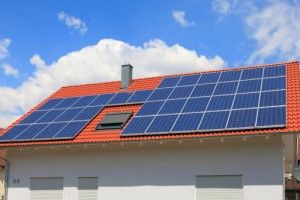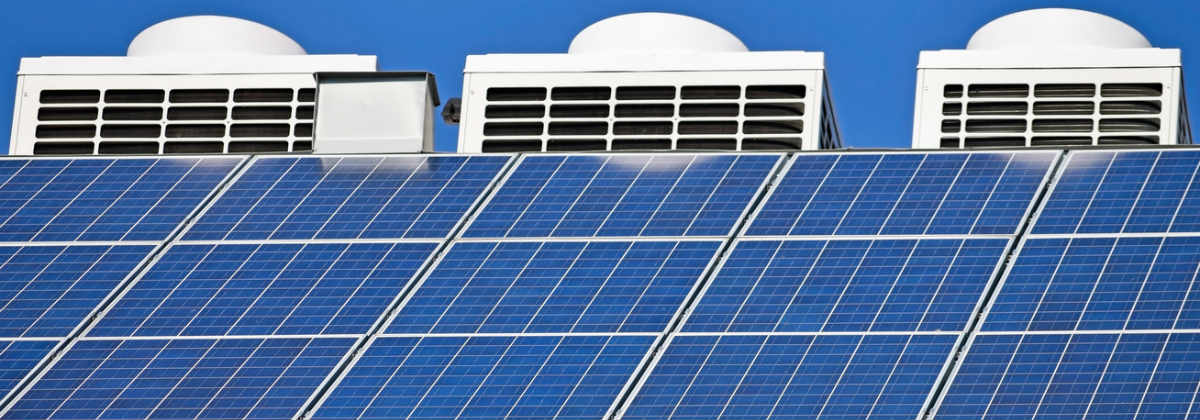With Australia being one of the hottest countries, air conditioners can be found in almost every home. However, it’s soon obvious to anyone who purchases an air conditioner that the most significant outlay is the ongoing running costs. But there may now be a way to mitigate these costs. And that’s by investing in solar air conditioning.
In this article, we explain how solar air conditioners work, what types are currently available and whether they are worth the switch. Read on to find out.
On this page:
Advertisement
How do solar air conditioners work?

Solar air conditioners are simply cooling and heating systems that utilise solar power rather than electricity from the grid. These systems are fit with their own solar panel component, in a similar fashion to solar hot water systems, which captures the sun’s rays to convert it into usable electricity for the air conditioner.
While they can have a significant upfront installation cost – primarily due to the solar panels – solar air conditioners are considered to be much cheaper to own and operate in the long term as they utilise virtually unlimited energy provided by our sun.
Solar energy is a great way to decrease both your electricity bill and your carbon footprint, so what are some different ways to incorporate solar powered air conditioning it into your home?
Types of solar air conditioning
There are essentially two types of solar air conditioners for use in the home: off-grid and hybrid.
Off-grid solar air conditioners, as the name suggests, can support use without a need to connect to the electricity grid. These systems are typically equipped with a back-up power source, such as a solar battery, to help support energy production in the evening or during periods of overcast weather. With an off-grid system, the solar air conditioner will prioritise usage of solar energy during the day and actively switch to back-up power supply during the evenings. The back-up power source can then recharge during daylight hours using the panels.
Hybrid solar air conditioning systems on the other hand still rely on a grid connection to power the system during the evening or periods of overcast weather. These systems generally aren’t compatible with energy storage connections and instead draw additional power from the electricity grid when it can’t be matched with solar. A hybrid solar air conditioner however, will still prioritise the use of solar energy where it can.
Pros and cons of solar powered air conditioning
So, what are some of the benefits of switching to solar air conditioning? And what should you be cautious of if you choose this air conditioner type? We list some of the pros and cons of solar air conditioners below:
| Solar air conditioning pros | Solar air conditioning cons |
|---|---|
| Helps to reduce reliance on grid electricity which can aid in reducing power bills | Upfront installation costs can be very expensive |
| If reverse cycle, can be used for both heating and cooling in the home allowing for year-round usage | May still need grid power to use at night or during overcast days |
| Helps to reduce greenhouse gas emissions from energy usage | Solar panels can only power the air conditioner – no other appliances in the home can be connected to that particular system |
How do I get solar air conditioning?
To get solar air conditioning in Australia you’ll need to find a licensed solar installer who can help you to fit the system to your home. It should be noted that solar powered air conditioning requires its own set of solar panels and inverter system. This means if you already have solar panels fitted to your rooftop, you’ll need to install an additional set, which is compatible with the air conditioner, to power your system.
Given this is fairly new product in market, you may find you have a limited options when it comes to solar air conditioner installers. However, it’s always good to compare offers from at least three installers (if possible) before making a purchase decision.
Already got solar panels? See if you are missing out on a better solar energy plan below
Here are some of the cheapest solar-specific deals from the retailers on our database. These costs are based on the Ausgrid network in Sydney but prices will vary depending on your circumstances. We show one product per retailer, listed in order of lowest price first. Annual price estimates assume general energy usage of 3900kWh/year for a residential customer on a single rate tariff. Price estimates exclude solar feed-in tariff credits. These are products from referral partners†. Our database may not cover all deals in your area, and please check retailer websites for up to date information.
Here are some of the cheapest solar-specific deals from the retailers on our database. These costs are based on the Citipower network in Melbourne but prices will vary depending on your circumstances. We show one product per retailer, listed in order of lowest price first. Annual price estimates assume general energy usage of 4000kWh/year for a residential customer on a single rate tariff. Price estimates exclude solar feed-in tariff credits. These are products from referral partners†. Our database may not cover all deals in your area, and please check retailer websites for up to date information.
Here are some of the cheapest solar-specific deals from the retailers on our database. These costs are based on the Energex network in Brisbane but prices will vary depending on your circumstances. We show one product per retailer, listed in order of lowest price first. Annual price estimates assume general energy usage of 4600kWh/year for a residential customer on a single rate tariff. Price estimates exclude solar feed-in tariff credits. These are products from referral partners†. Our database may not cover all deals in your area, and please check retailer websites for up to date information.
Here are some of the cheapest solar-specific deals from the retailers on our database. These costs are based on SA Power network in Adelaide but prices will vary depending on your circumstances. We show one product per retailer, listed in order of lowest price first. Annual price estimates assume general energy usage of 4000kWh/year for a residential customer on a single rate tariff. Price estimates exclude solar feed-in tariff credits. These are products from referral partners†. Our database may not cover all deals in your area, and please check retailer websites for up to date information.
Are solar air conditioners any good?
A solar air conditioner could prove to be a good investment for households looking to reduce their air conditioner running costs in the long term. With these systems harnessing energy primarily from the sun, solar air-conditioned households can become less reliant on the grid, which can not only help to reduce electricity costs but also help to reduce the household’s carbon footprint.
The hurdle however, lies in the significant upfront costs of installing one of these systems. It may benefit households to consider whether the savings will outweigh the upfront costs before committing to a purchase, particularly if its only a small system being installed or a small living space they are cooling and heating. Households in cooler climates or less sunny areas may also wish to consider whether the system will achieve its full savings potential in their area. Those with back-up power may be able to meet the savings potential quicker than grid-connected devices but if there’s little to no sun for most of the usage times, the benefits of a solar air conditioner may not come to fruition.
If you are in the market for a solar air conditioner, or are thinking of installing solar more generally in your home, then be sure to check out our most recent solar installer ratings. Here we list the installers that Aussie consumers have rated top notch for service, price, products and more. See the top brands by clicking the link below.




Share this article